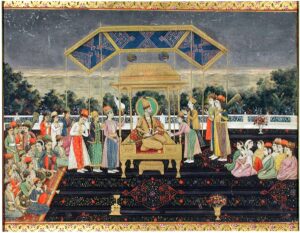
From as far back as I can remember, I’ve heard various people say that Hinduism was created by the Persians, and that it was the Persians who gave it the name “Hindu.” Some even say that the name “Hindu” does not appear in ancient texts.
Throughout Tamil Nadu, this idea is frequently mentioned on Dravidian movement platforms. Many within the Hindu community who consider themselves rationalists also say this. However, this line was actually propagated by Christian missionaries in the 19th century. These individuals adopted it from there. They all have their own agendas. It’s impossible to convince them by arguing. Instead, we need to understand the real fact in connection with history.
The Himalayas stand majestically to the North of us. The Mahabharata describes it as the abode of the gods. In the Kumarasambhavam, Kalidasa refers to it as “Devadātmā Himālaya” (the divine soul Himalaya). The Purananuru in Tamil also mentions it, saying, “The tall mountain to the north covered in snow.”
The British began surveying India using modern methods starting from 1802. They measured the Himalayas and estimated the height of its peaks, naming the highest one “Peak XV.” In 1865, this peak was renamed Mount Everest after Sir George Everest, a British surveyor. However, in Tibetan, Nepali, and the local Sherpa languages, this peak already had several names.
If someone today claimed that Mount Everest was “discovered” only in 1865 and did not exist before that, we would question his/her sanity. Similarly, even if the term “Hindu” was not used in ancient times, the spiritual traditions and philosophies that are now called Hinduism certainly existed. We need to identify what it was called. What was its name then?
There has been extensive discussion about the formation of religions. To provide a concise and simple overview, religions can be broadly categorized into two types: natural religions and prophetic religions.
Prophetic religions are manifestations of a prophet’s teachings. These teachings are passed down through the prophet’s disciples, forming the basis of belief for those who follow them. Over time, these teachings are organized into institutions, evolving into a system of philosophy and practice. These organizations play a significant role in the lives of believers, shaping their beliefs and practices. As such, they are referred to as religions.
For example, Jainism, Buddhism, Christianity, Islam, Sikhism, and other such religions are prophetic religions. The prominent prophets of these religions identify themselves as originating from teachings of their respective first prophets. For instance, followers of Jainism believe that before Varthamana Mahavira there were 23 Tirthankaras and he was the 24th Tirthankara. However, the teachings of Varthamana Mahavira are considered the beginning of that religion.
In India, there was a prophetic religion called Ajivaka, established by Makkhali Gosala. It has disappeared. Many prophetic religions existed in Central Asia but have vanished. In Iran, the religion of Manichaeism, founded by the Persian prince Mani in the 3rd century CE, was widespread. It has also disappeared. Zoroaster, a prophet in Persia, established the Parsi religion, which exists today on a small scale. Among these prophetic religions, Christianity and Islam are predominant today.
Similarly, new prophetic religions continue to emerge. Nearly two centuries ago, the Baha’i Faith was established by Bahá’u’lláh, who lived in Iraq from 1817 to 1892. Today, the Baha’i Faith is practiced worldwide. Before the twentieth century, from 1835 to 1908, the Ahmadiyya Muslim Community was founded by Mirza Ghulam Ahmad, who lived in Punjab. These are among the religions that branched off from Islam.
Natural religions are not those that originate from a specific prophet but which arise naturally from history. Their origins precede recorded history. It is impossible to pinpoint how or when any natural religion emerged. They develop and evolve naturally through the course of history.
Therefore, in each era, they have different names. They have names related to the place. They have names related to ethnicity. There are names given by observers from outside. Furthermore, there might also be a name that emerged through folklore over time.
Hinduism, as we call it today, is a natural religion. Similarly, there have been many religions worldwide. In Europe, ancient Greek religion was a natural religion that provided wisdom to the world. Philosophers like Aristotle, Plato, and Socrates were all followers of that religion. It is now identified by the name of that country. Apollo, Poseidon, and Sophia were among the Greek deities.
All the natural religions that existed in Europe have disappeared. They are commonly referred to as ‘Pagan’ religions. This name was assigned by the Christians of the later period. ‘Pagan’ means primitive, crude, and unrefined religion. It was considered that the deities of these religions are now merely myths or statues. One of the Pagan religions is Celtic religion. That’s the ethnic name of those people. Thor, now portrayed with a hammer in Hollywood movies, is the deity of the Celtic religion.
Bon was a natural religion practiced in Tibet. Shinto was a natural religion in Japan. Judaism is also a natural religion. The religion that existed in Egypt was also a natural religion. The roots of these natural religions are indigenous.
When Persian traders came to India, they referred to the river Sindhu as “Indus.” They called the people living around it “Hindus.” When the Islamic rulers took control, they referred to them as “Hindus” for administrative purposes. When the English came to power, they continued to follow the administrative procedure of the Mughal era and they also used the term “Hindu.”
Yes, the term “Hindu” was coined by the Persians. It was formalized by the British. In the centuries to come, this name may change to another one. Many rivers have multiple names. Each language has its own name for mountains. Natural religion is not a limited company identified with a brand name. It is a natural phenomenon.
The term “Hinduism” refers to a spiritual tradition that has evolved over thousands of years, developing, diversifying, and adapting to the present form we recognize today. Understanding how it originated, evolved over different periods, and the various names it has been known by throughout history is essential for us. Only then can we grasp how it developed, evolved, and assumed its current form.
If we equip ourselves with this knowledge, we can confidently counter using these facts, when someone says that Hinduism is created by Persians.
Jeyamohan












